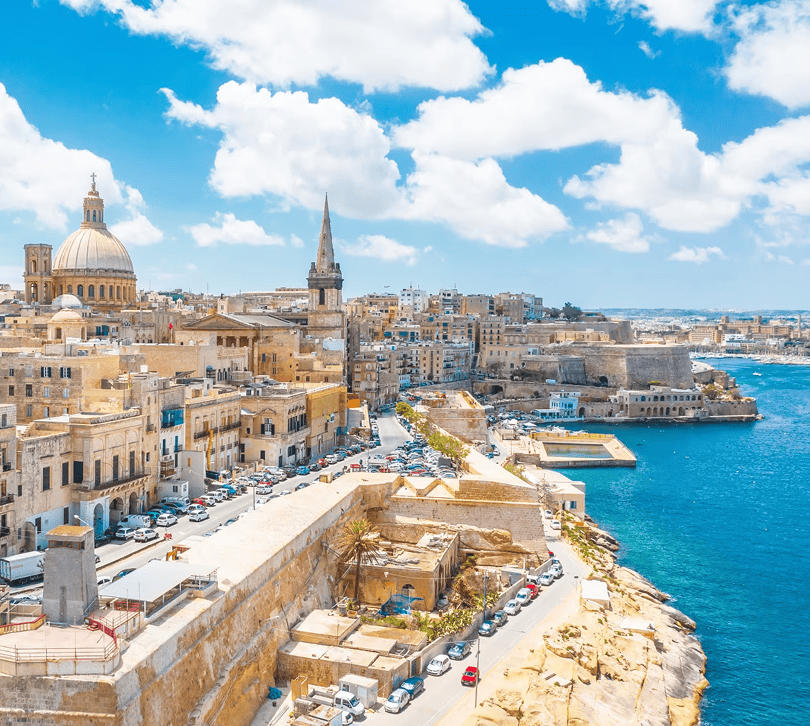Introduction
The tax treatment of income and capital gains in Malta for individuals is subject to several rules and regulations setting out the general and detailed framework applicable to such income and capital gains.
Malta asserts rights to tax income and capital gains derived by individuals based on territoriality, residence, domicile, and remittance (i.e., receipt in Malta). The applicable rules can be complex, and we will try in this article to simplify and explain the general principles behind the rules.
Taxation for Residents and Domiciled Individuals
Persons who are both ordinarily resident and domiciled in Malta are subject to tax on a worldwide basis, i.e., both income and capital gains arising in Malta and outside Malta are subject to tax in Malta regardless of where such income or capital gains are paid, received, etc.
Persons holding status as long-term residents in Malta (including holders of permanent residence certificates or cards) are also subject to tax in Malta on a worldwide basis, and the same applies to persons who are married to a person who is ordinarily resident and domiciled in Malta.
Certain income and capital gains deemed to be arising in Malta may be subject to tax in Malta, regardless of the residence and domicile status of the recipient of such income. Examples include rental income or capital gains derived from immovable property situated in Malta and income from services where the activity of such services is physically provided in Malta.
The Remittance Basis of Taxation
The remittance basis of taxation applies to persons who are either not domiciled or not ordinarily resident in Malta (typically a Malta resident but not a Malta-domiciled person). The relevant rules mean that:
- income arising in Malta is subject to tax in Malta, regardless of where such income is received.
- income arising outside Malta is subject to tax in Malta only if such income is received in Malta.
- capital gains arising outside Malta are not subject to tax in Malta, even if such gains are received in Malta.
Persons to whom the remittance basis of taxation applies may be subject to special rules providing for a minimum annual tax liability. The application of these general principles depends on some basic terms and concepts, such as residence and ordinary residence, domicile, income, capital gains arising in Malta, and income received in Malta.
Key Concepts: Residence, Ordinary Residence, and Domicile
The concept of residence does not depend on nationality or any other civil status but is often referred to as a “question of fact.” A person may be deemed to be resident in more than one country, and this is where double tax treaties may help in establishing which country should be deemed the residence country.
A physical presence in Malta for 183 days or more in a particular calendar year will establish residence in Malta for Maltese tax purposes (regardless of the nature or purpose of the stay). A person moving to Malta with the intention to establish his or her residence in Malta will be deemed a resident in Malta from the date of arrival (i.e., before 183 days have passed).
A person who lives in Malta on a permanent or indefinite basis is deemed ordinarily resident in Malta. Persons who are in Malta temporarily may become ordinarily resident in certain circumstances, e.g., persons coming to Malta regularly over some time (typically 3 years or more) who establish personal and economic ties with Malta.
Domicile
Again, the concept of domicile does not depend on nationality, and every individual acquires a domicile at birth (i.e., “domicile of origin”). A domicile of origin is normally the domicile of the parents of the individual at the time of birth.
Domicile is more than just residence; it is also a question of intent (to live permanently in a country) and where the individual considers “home” to be.
A person can only be domiciled in one place at a time, but it is possible to change domicile by acquiring a “domicile of choice.” A person taking up residence in a country with the intention of making the country his or her permanent home may claim to have acquired a new domicile. However, it is possible to take up residence in a country for a very long time without acquiring a new domicile if the intention is someday to return to the person’s country of domicile (or somewhere else).
Since intent plays an important role in establishing a domicile, it is normally up to the individual to claim a change in domicile.
Income and Capital Gains Arising in Malta
Income derived from employment or the carrying out of a profession or business in Malta is deemed to arise in Malta if the activities resulting in such income are performed in Malta.
There is no minimum time in this respect, but a double taxation treaty between Malta and another country may have provisions with regard to the taxation of such income if it is carried out through a permanent establishment or is connected to a limited duration of stay.
Passive types of income, including dividends, rents, and interest, are normally deemed to arise where the source of the income is situated (i.e., the company paying the dividend, the property rented out, or the bank deposit or debtor resulting in interest payment).
Capital gains arise in Malta if the asset being transferred is situated in Malta.
Income Received in Malta
Income is deemed received in Malta if paid to the recipient in Malta, e.g., to a bank account held in Malta. This also applies to income that was paid into an account held outside Malta if it is then subsequently remitted to Malta.
Remittances through the use of credit cards, payments directly to a third party’s account from a foreign account, etc. for ordinary expenses such as living expenses, rent, etc. are presumed to be remittances of income to Malta unless the person can prove otherwise.
Remittances of a capital nature, such as inheritance or proceeds from the sale of assets situated outside Malta, would not be deemed income, and the receipt in Malta of such funds would not be subject to tax in Malta.
Minimum tax liability for non-domiciled persons
A minimum tax liability of €5,000 per annum applies to ordinarily resident, but not domiciled, persons if such persons have income anywhere in the world of €35,000 or more in any year (regardless of whether such income is remitted to Malta). Double taxation relief may be claimed on tax paid outside Malta against the minimum tax liability if the income in question has been remitted to Malta.
A person can opt to be taxed on a worldwide basis if his tax liability on a worldwide basis is less than the minimum tax.
Different minimum tax liabilities apply to individuals who are beneficiaries under a special tax status regime, such as the Global Residence Programme, the Residence Programme, the Malta Retirement Programme, etc.
Finally
The above is meant as a simple and brief introduction to the rules applicable in Malta and should not be construed as tax advice on a particular set of circumstances. As the saying goes, “the devil is in the details,” so a person’s particular circumstances may have a substantial bearing on the outcome of their tax obligations; therefore, proper advice should always be taken before taking up residence in Malta. Contact our team, and we will arrange a residence planning consultation to discuss in more detail as well as answer any questions you may have.

















